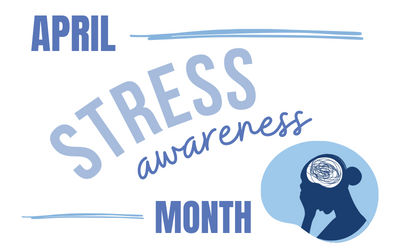Stress is unavoidable. Period. Whether we’re juggling our family with our career, worrying about money, caring for sick or elderly parents or even taking care of our own health concerns, there are an infinite number of ways to become stressed out.
Typically, we can manage stressful situations when they arise, and then move on to our normal state of mind. In fact, feelings of stress may help us manage these stressful periods, by helping us to become more focused and more proactive in resolving the stressor.
But, what happens when stress takes over, and negatively impacts our lives? Let’s explore stress, and learn how much stress is too much.
National Stress Awareness Month
In an effort to bring attention to how stress can truly harm you, the National Institutes of Health (NIH) recognize April as National Stress Awareness Month.
First, it’s probably wise to define stress. Stress is a normal emotional response to circumstances and situations out of your normal range. The tension and mental strain you feel is because your body and/or your mind are being pushed past their typical comfort level until you’ve gone beyond your limit.
Keep in mind, as just mentioned, not all stress is bad stress. Obviously, being fired from your job or learning of a serious health issue will likely elicit a negative stress response. On the flip side, stress can be a positive, too. Think about parents taking their newborn home from the hospital or being surprised by a special birthday party. Stressful events? Absolutely! But “happy” stress can be typically managed without issue.
Are you too stressed?
Take this quick true/false quiz to find out if stress is a problem for you.
- I often overreact to certain situations.
- I find myself getting upset over small things.
- I sometimes experience unexpected dry mouth.
- I’ve experienced a change in heart rate or breathing rhythm.
- I lose patience when I have to wait for something (elevator, traffic lights, standing in line).
- I over perspire, even when not exercising.
- I experience fear, even when I know I’m not in danger.
- I’m irritable, and find myself lashing out at others.
- I feel like I’m close to the point of panic.
- I find it hard to calm myself down, once I become triggered by something.
- I overreact when I’m interrupted.
If you answered “true” to some of these statements, then you may be dealing with too much negative stress in your life. Let’s get to work on alleviating that stress!
Too much stress is unhealthy
We might think of too much stress as being solely an issue for your emotional well being, but the sad truth is that too much stress can have a serious negative impact on your physical health, too. Here are just a few potential stress-related health concerns that can’t be ignored:
- Headaches
- Weight gain or loss
- Insomnia or trouble sleeping
- Heart disease
- Digestive issues
- High blood pressure and stroke
- Muscle tension
- Increased susceptibility to cancer
If you feel you may be under too much stress, and are no longer able to manage it on your own, make an appointment to see your doctor. S/he can discuss care options with you, which may include talk therapy, medication or some lifestyle changes. Don’t wait to seek the help you need!
What are some strategies for managing stress?
The good news is that you have a lot of options for self-treating stress. While it may not be possible to remove the stress-inducing elements in your life, here are some suggestions for helping you to manage them. These healthy strategies benefit everyone, even those that are fortunate enough to live a stress-free life.
- Incorporate exercise into your daily routine – We all know that exercise improves our overall health and makes us feel good. Exercise also triggers a secret weapon to combat stress – endorphins. Endorphins are our brain’s feel-good neurotransmitters, and exercise has been shown to increase production. Win! (Hey, why not check out the Swan Family Wellness Center adjacent to Faith Community Hospital in Jacksboro. A gorgeous pool, plenty of classes, gym equipment and helpful trainers await you!)
- Choose a healthy diet – Believe it or not, eating a lot of processed foods, like deli meat, fried food, refined cereals and sugary treats, can actually make you more prone to anxiety and depression. Try upgrading your diet to include plenty of whole grains, fruits, veggies and lean protein.
- Maintain a regular sleep schedule – Quantity AND quality matter here. Studies have shown that more sleep translates to less stress. And, the best way to achieve quality sleep is to maintain a regular schedule of going to bed and getting up at about the same time, every day.
- Minimize your consumption of caffeine, alcohol and nicotine – No need to give up your morning coffee, but excessive amounts of caffeine have been shown to exacerbate anxiety.
- Try some relaxation techniques like meditation, aromatherapy or biofeedback – The key to these and other strategies is “mindfulness”. They allow our body and mind to take a pause from everyday stresses. Enjoy the peace!
As we noted above, not all stress is bad, and not all stress is too much stress. Consider the statements in the “Are you too stressed” quiz, above. If you recognize some of these behaviors in yourself, or if others have commented on how you manage (or don’t manage) stressful situations, consider trying some stress management techniques, to get you on the road to a more peaceful life.
Additionally, make an appointment with your family doctor at Faith Community Health System to discuss your stress. Your doctor can make sure your rapid heartbeat or excess sweating, as examples, are indicators of another healthcare concern. They can also discuss medications and other options for managing your stress level.

